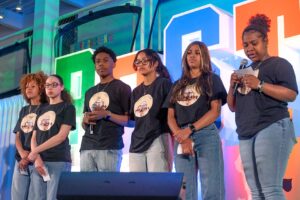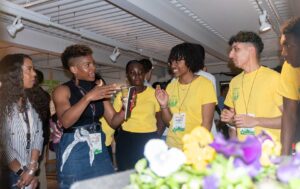In the Aspen Challenge, Boston students have the answers
Student-driven solutions tackle youth homelessness, green-space access, gun violence

A texting hotline to connect homeless youth to services. Turning an unused part of campus into a new green space for students. A playbook guide for hosting gun violence awareness panels.
These were some of the solutions dreamt up — and implemented — by Boston Public School students as part of the Aspen Challenge, a 10-week-long program where teams from 17 different BPS high schools worked to develop answers to some of their community’s heftiest problems.
Students presented their projects at the Aspen Challenge Solutions Showcase, at the Artists for Humanity building in South Boston, April 29.
Across the competition, students tackled five challenges that were issued in February, when this round of the challenge was launched. They included creating a media campaign to raise awareness around gun violence, turning underutilized space in the community into green space to address urban heat, supporting youth facing homelessness, creating post-secondary pathways for young people and addressing the link between substance use and social media.

Margarita Muñiz Academy students present their “Bos School Safety” project, an effort that gathered officials for a panel about
gun violence and created a playbook to support other schools in running similar events. The solution was one of three winning projects in the 10-week Aspen Challenge Solutions Showcase. PHOTO: AVERY BLEICHFELD/BAY STATE BANNER
Overall, students generally opted to tackle the challenges around homelessness and green space. Six of the 17 teams created solutions to support their unhoused peers and five worked to make new green space in their communities.
Members of the Aspen Challenge team and district officials commended students for working to tackle the issues, all which center on challenges for which adults have yet to create definitive solutions.
“You are the change that we need. You are the brilliance that we need. And you’ve been the diligence and the work that we need to make it happen,” said Tom Lombardi, BPS secondary superintendent for college, career and life readiness, at the solutions showcase.
At the program’s launch, in February, BPS Superintendent Mary Skipper said she believed if students embraced the challenge, it would be a life-changing experience, something that she said came to fruition.
“You’ve come to see the power of working on a team, of your voice and your agency and importance, and of what it means to take on some of the most difficult challenges that our schools and our city and frankly, our society face,” Skipper said, during remarks at the awards ceremony, April 30.
Three teams were selected as winners of the challenge.
The team from Edward M. Kennedy Academy for Health Careers created what they called “Streetlight,” a free, automated texting hotline to help students at their school experiencing homelessness access supports. The tool provides crisis support information, homework help options, inspirational quotes and housing services.
In conducting a student survey, the team realized that many of their peers didn’t know what resources were available, though many services exist. Their solution aimed to raise awareness about those services while helping their peers maintain privacy.
“As young people attending a health care school, we care deeply about public health issues. Homelessness is a prevalent health issue that touches all facets of life for young people,” one member of the team said, during their presentation to the judges.

Students from Boston International Newcomers Academy talk with judges about their “Schoolyard for Everyone” project, which
transformed an underutilized area on their campus into a green space for students, at the Aspen Challenge Solutions Showcase. PHOTO: AVERY BLEICHFELD/BAY STATE BANNER
Students from Excel High School created a from-scratch music video as part of a media campaign to raise awareness about gun violence. They paired the video with a red chair, with a sticker that read “No seat for gun violence. Reserved for victims,” which they’re hoping to put in schools, and on MBTA buses and trains to raise awareness. Already, they said, they’ve been “guerilla tagging” seats around the city with the same sticker.
“We want people to understand that this is going on all over,” one student said. “The chairs in schools, in different places like that, is also to represent that people can see that it’s actually there. People can see that people are impacted by this.”
The third winning team, from Margarita Muñiz Academy, also tackled the gun violence challenge by hosting a panel with officials to spark conversations about the topic.
“This is real, in our daily lives, in this nation,” said one student, during the presentation. She said that all eight members of the team had witnessed or experienced violence in some form.
“We need to talk about this now, not after another tragedy,” she said.
Out of that panel, they created a playbook, called “Panel for Prevention,” aimed at helping others run similar events in other schools and communities. The guide offers a step-by-step walkthrough, which they emailed to all 31 high schools in Boston in both English and Spanish. At the time of their presentation, they had heard back from two schools.
The Aspen Challenge team also presented three special awards to teams.
Boston International Newcomers Academy was awarded the “originality award” for their solution that turned an underutilized part of their campus into a garden and green space for students, complete with public art.
Boston Arts Academy received the “collaboration award” in recognition of how they divided up responsibilities while putting together their “Substitute the Substance” solution, encouraging young people to move away from substance use and abuse through art and other hobbies.
The English High School was awarded the “resilience award” for putting together their solution — a website with resources and care packages for homeless students — despite facing a host of challenges, like losing three members of their team.
Katie Fitzgerald, director of the Aspen Challenge, said the solutions students presented were some of the most creative and innovative the challenge has seen — which she insisted she doesn’t say lightly.
“There is something really powerful that happened here today,” Fitzgerald said in an interview at the showcase. “The agency that these young people really took and transformed into implementing ideas, it was pretty exciting and remarkable, and it’s something we’ve never seen before.”
Student solutions often included outreach and work with city officials — something Fitzgerald said the program has seen before, but not to the scale that Boston students pulled off.
“What that is, is young people literally figuring out where we need to go, who has the power, and we’re going to go directly to the power,” Fitzgerald said.
The team from Margarita Muñiz Academy, as part of their winning effort to raise awareness about gun violence, put together a panel with officials that included at-large City Councilor Henry Santana, Suffolk County District Attorney Kevin Hayden and representatives from the Massachusetts Attorney General’s Office.
And the Tech Boston Academy team, also focused on gun violence, met with members of the Boston City Council and put together a pledge that they got 11 of the 13 councilors to sign. They also formed a partnership with the Boston Public Health Commission.
A handful of teams, across challenges, tapped Skipper to participate in focus groups and informational interviews.
“These partnerships and connections are really important for our community, in order to keep that connection and inspire growth for our students and for the victims of guns,” one student from the Tech Boston Academy said.
The idea of engaging with officials, Fitzgerald said, was not something that the team organizing the Aspen Challenge or the adult coaches from each school put into the heads of students. Rather, it was something they took on themselves.
Some of that might have been the culture in Boston, which she said felt more approachable in a way that made “the mountain to climb for young people” seem less daunting, but it’s also a mark of how the students took initiative.
“Every single team decided that’s what they wanted to do, and they did it,” she said. “And that is with zero adult help and zero adult pushing.”
The three winning teams will present at the Aspen Ideas Festival in Colorado, in July.
But for all the teams, the goal is to keep the projects going.
To support those efforts, the Aspen Challenge offered student teams a new round of funding to continue their solutions and will be leading “reflect and learn meetings” with the teams, as well as connecting students with local mentors and challenge alumni.
“What did you learn? How are you going to refine your project? How can we continue to keep it going?” Fitzgerald said. “And then we create pathways to partners in the Boston area for every single school.”
During their presentations, students also described an interest in keeping their work moving forward.
But, despite new work on the horizon, the presentations and the end of the competition also marked a moment of celebration of what Fitzgerald described as “17 revolutions started in Boston by Boston youth.”
“We kicked things off in February, and you shot for the stars, and you went for it, and it was truly, truly, truly incredible,” Fitzgerald said to students during the award ceremony. “You picked topics you were passionate about, and you just created change. Boston is a different place today because of you.”






